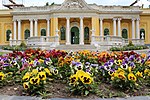District XVII of Budapest (known as Rákosmente) is a suburban district of Budapest on the left bank of the Danube, in the eastern part of the capital. It is Budapest's largest district, with an area of 54.82 km2, and home to nearly 90,000 people, making it the seventh most populous district of Budapest. Towns that were different in nature, but closely connected, were annexed to the capital in 1950 as part of the Greater Budapest plan. It is one of the most beautifully located districts of Pest, which is partly located as high as the 235 meters Gellért Hill. As the district is part of the Pest Plain, which gradually rises from the Danube to the east, the district's area is almost entirely hilly. The 241 meter high Erdő Hill, the highest point of the Pest side and the Pest Plain is also located here.The majority of the district is green area, in terms of per capita green and forest areas, the 2nd district of Budapest, the Hegyvidék and as well District XVII is the best-served districts of the capital. There are several nature reserves in its area, such as the 40-hectare Merzse-marsh full of plant rarities and rich birdlife, the vast green area of the Keresztúr Forest, and Lake Naplás, the second largest nature reserve in Budapest with 150 hectares, is also one of the most valuable ecological areas in the area.
District XVII was the most popular district of Budapest according to the moves in 2019, 1045 more people settled here down than who moved out. The population of the suburban district growth as a result of suburbanization and still increasing today, despite the fact that the population of Budapest has decreased by hundreds of thousands in recent decades. Due to the population growth, new housing estates areas were built on previously green or agricultural areas, and the existing ones were expanded.
The district has high level of public transport supply, with 67, 97E, 161, 161A, 169E, 261E bus lines taking 15–20 minutes from the western part of the district and around 25 minutes from the eastern part to arrive directly to Örs vezér tere and to Metro Line M2, while with 68, 201E, 202E buses Kőbánya-Kispest metro station and Metro Line M3 is directly accessible. The area is easily accessible from the city center at night with 956 and 990 night buses, which covering almost the entire district. In addition, there are six train stops in the immediate vicinity of the residential areas, from where can be reached the Budapest Keleti railway station in 15 minutes with modern suburban trains.









